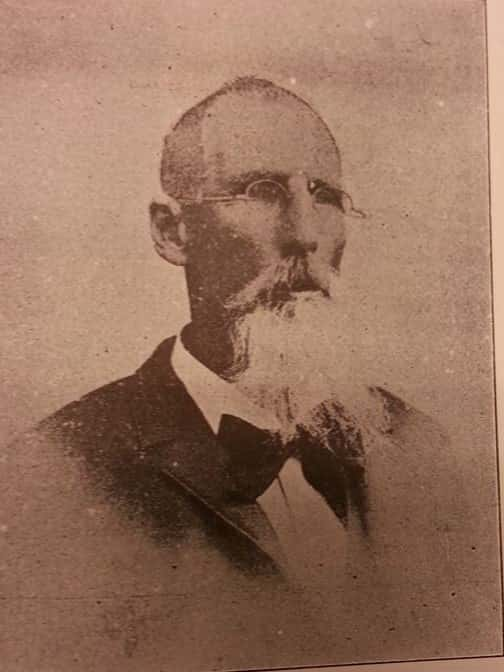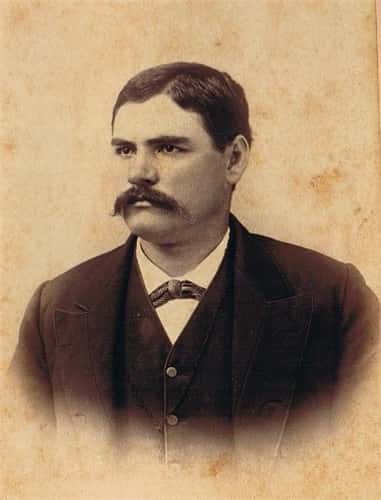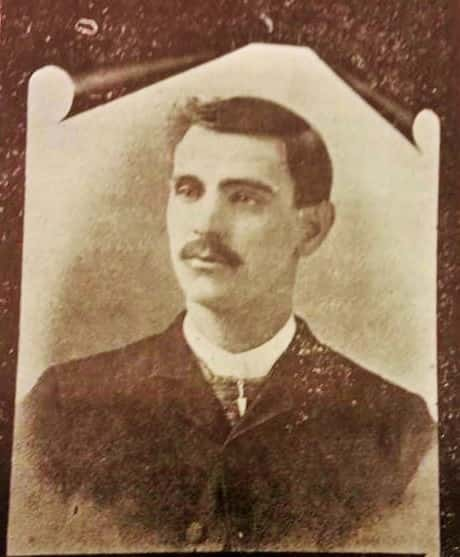The Wild Election of 1894
Written by Justin Lamb

Above: County Judge John J. Dupriest was a political maverick in Marshall County and helped formed the Marshall County Populist Party in the 1890s.
If you think this year’s election has been drama filled and full of heated rhetoric, wait until you read about the local county election of 1894. The animated election saw the creation of a new political party, rumors of a duel challenge by the sheriff’s candidates, and an all-out brawl on the courthouse square on election night.
With its conservative states’ rights platform, the Democratic Party had always been the dominate party in Marshall County since the days of Andrew Jackson. Nurtured in the cradle of Jacksonian Democracy, the people of Marshall County strongly supported the memory of Ole Hickory by casting large vote totals for Democratic candidates on all levels of government. Not even the nomination of Kentucky native Henry Clay on the Whig Ticket in the 1844 Presidential Election could break Marshall County’s fierce loyalty to the Democratic Party. When the Civil War began in 1861, a majority of Marshall County Democrats supported the Southern cause and zero votes were given to Republican Abraham Lincoln in the 1860 presidential election. Though the Southern Confederacy went down in defeat in the spring of 1865, Marshall County voters stayed true to the lost cause of the Confederacy for years to come by electing Democrats to every office in the county.
But things began to change by the latter part of the 19th Century as the Democrats dominance in Marshall County began to be challenged. The political landscape was highly volatile all across the nation in the 1890s as farmers began revolting in response to low agricultural prices in the South and Midwest. These farmers had generally found their political home in the Democratic Party, but began to feel alienated by the conservative business-leaning leaders of the national party and were as equally distrustful of the Republican Party which was controlled by big business and big banks. On July 4, 1892, disgruntled farmers all across the nation met in Omaha, Nebraska to form their own political party, the Populist Party which adopted a platform calling for the abolishment of national banks, graduated income tax, implementation of the eight hour work day, and the direct election of United States Senators.
With farming as the number one occupation in Marshall County at the time, the message of the Populist Party began to take hold with Marshall County voters by 1894. Many progressive members of the local Democratic Party led by Dr. Samuel Graham of Briensburg began to leave the party in droves to form the Marshall County Populist Party. The party gained traction in Marshall County when County Judge John J. Dupriest filed to run for re-election as a member of the Populist Party.
Dupriest, a Confederate veteran who served under fellow Marshall Countian Colonel Allred Johnston during the war, was first elected in 1890 in hotly contested race. Dupriest was serving on the Fiscal Court as Magistrate for the Briensburg district when he challenged fellow magistrate T.F. Harrison of Solider Creek. Both men had served together in the war, but were fiercely split over an appropriation measure to construct the new county courthouse. Harrison and his faction supported the measure while the fiscally conservative Dupriest and his supporters were opposed. Harrison was able to garner enough votes at the Democratic county convention to gain the nomination for county judge, but Dupriest and his supporters bolted the party and formed the Independent Democratic ticket, or ‘Hayseed Democrats’ as they were called by their political enemies, which sent the election to the November General Election where Dupriest beat Harrison by 28 votes.
Over the next four years, Dupriest began to build a coalition of dissatisfied Democrats and newly formed Populists. Also joining the coalition were Republicans who for the first time had sensed an opportunity for political power in the conservative Democratic county. Even though they did not believe in the Populist platform, the Republicans proposed a political strategy of ‘fusing’ with the Marshall County Populist Party in order to capture county offices. In late August 1894, the Republicans and Populists met in Benton, and came to an agreement that the Republican Party would support the Populist candidates, and in turn, the Populist Party would support the Republican candidates.

Above: Sheriff Charles Henry Starks was unseated in the Democratic primary by J.H. Little, but bolted the Democratic ticket and ran on the Independent Democratic ticket in the November election.
Dupriest was challenged by Democrat J.M. Bean a local attorney who had run unsuccessfully for county attorney in 1890. In the county court clerk’s race, the Republican/Populist fusion backed Republican J.H. Ford of Benton against Democrat Walter Dycus. The Democratic nominee for county attorney was John G. Lovett who had defeated incumbent H.M. Heath in the Democratic primary. Upset by his loss, Heath refused to join the Populist/Republican coalition, opting instead to form an Independent Democrat candidacy against Lovett. The same scenario happened in the sheriff’s race where incumbent Charles Henry Starks was defeated in the Democratic primary by J.H. Little. Refusing to conceded, Starks ran on the Independent Democratic ticket against Little in November. The sheriff’s race became more animated when rumors circulated that Sheriff Starks challenged Little to a duel in Benton after he claimed his character was besmirched. Starks adamantly denied the duel challenge as the 1890 Kentucky Constitution prohibited public officials from challenging or fighting any duel and therefore would have prohibited Starks from holding office.
On Election Day, there were reports of voter intimidation throughout the county from all sides and a brawl ensued on the court square between Republicans and Democrat poll workers. After a hard fought and often bitter campaign, Dupriest was narrowly re-elected county judge over Bean by fifty six votes. With his re-election on the Populist ticket, John J. Dupriest became the first candidate in Marshall County to be elected to a county wide office that wasn’t affiliated with the Democratic Party. Additionally, the Populist Party elected two Magistrates to the Fiscal Court: M.G. Nelson of Olive in the first district and J.H. Draffen of Calvert City in the third district. The Republican Party elected two magistrates to the Fiscal Court with Isaac “Ike” Washam of Harvey in the fifth district and Henderson C. Hastin of Briensburg from the second district. The only Democrat to win a seat on the Fiscal Court was F.M. Pool of Benton in the fourth district.

Above: Despite the cracks in the Democratic majority in the county, Democrat John G. Lovett won the county attorney’s race in one of Marshall County’s biggest landslides.
In the race for sheriff and county attorney, the Democratic nominees easily swept their opponents. Democratic candidate for county attorney John G. Lovett won in one of the biggest landslides in Marshall County history. In the closely watched county court clerk’s race, Republican J.H. Ford was narrowly defeated by Democrat Walter Dycus despite the Populist/Republican fusion. “Republicans in the county are sick! Want to be kicked for ‘fusing”!” read the Democratic-leaning Benton Tribune. “The Republicans stood up for Dupriest but the Populists could not take the Republican dose of Ford! The Republicans are as mad as a March hare and are swearing like blue blazes that they will never again trust the Populists in any election.”
A month following the election, Judge Dupriest’s home was burned down and rumors quickly began to circulate that the fire was a result of arson by his political enemies. However, it was soon determined the fire was actually a result of a faulty flue. At the conclusion of his second term, Judge Dupriest opted not to seek re-election and he was succeeded by Democrat Robert Shemwell and the Fiscal Court returned to a Democratic majority. With Dupriest’s retirement from politics and the national Democratic Party’s adoption of populist ideals in their party platform, the Marshall County Populist Party was demoralized by a diminishing membership, and split by the dilemma of whether to fight the state and local level enemy (the Democrats) or the national foe (the Republicans and Wall Street). The party soon folded and many members rejoined the Democratic Party while a smaller number became Republicans, but memories of the wild election of 1894 lived in the minds of Marshall Countians for years to come.
